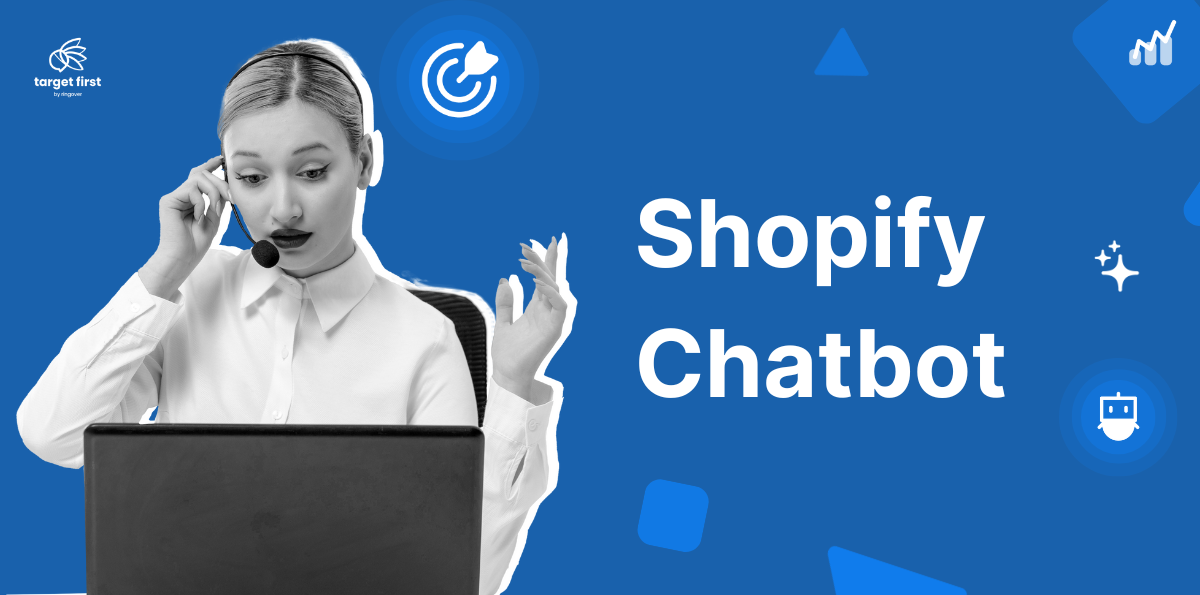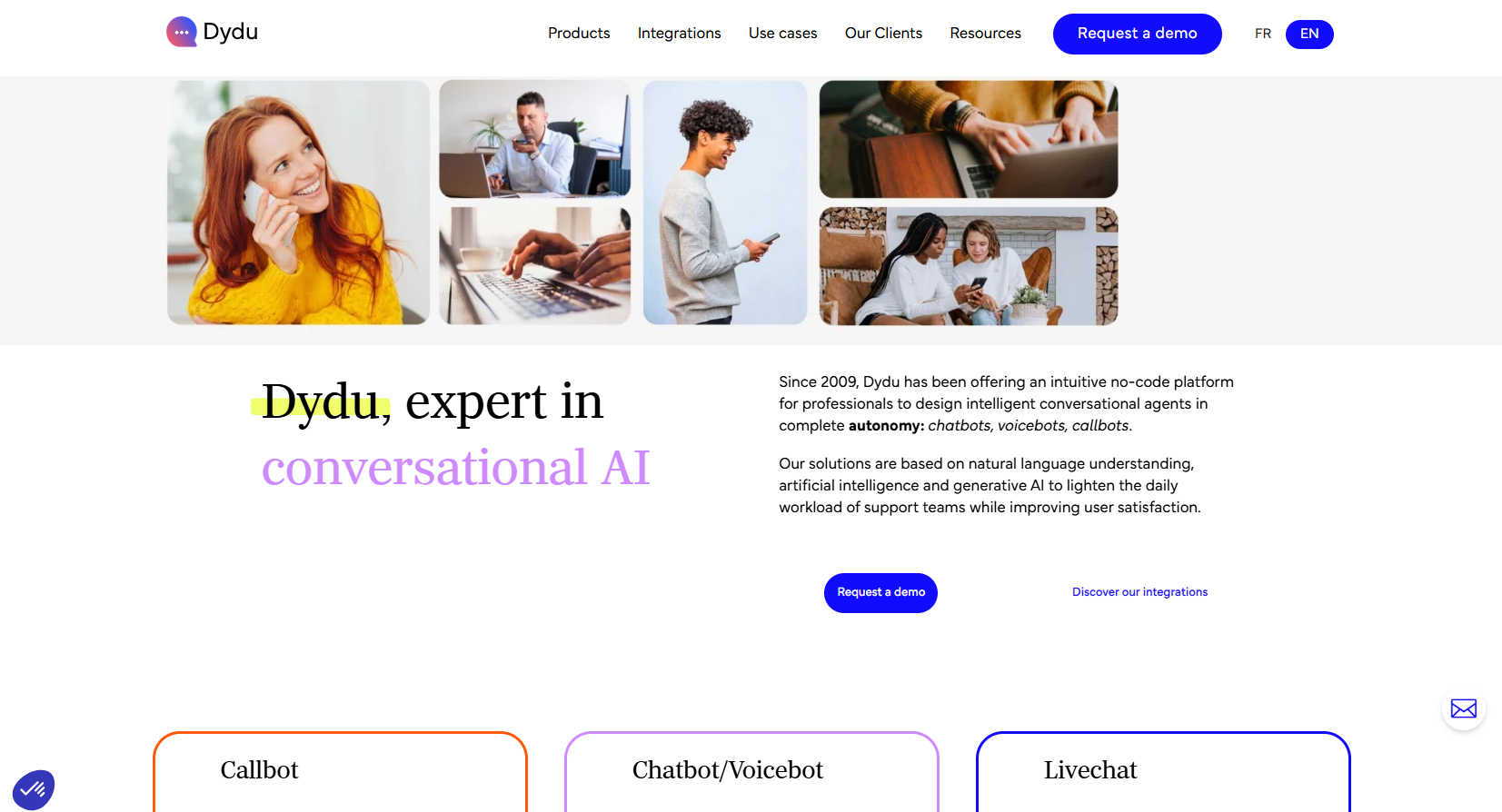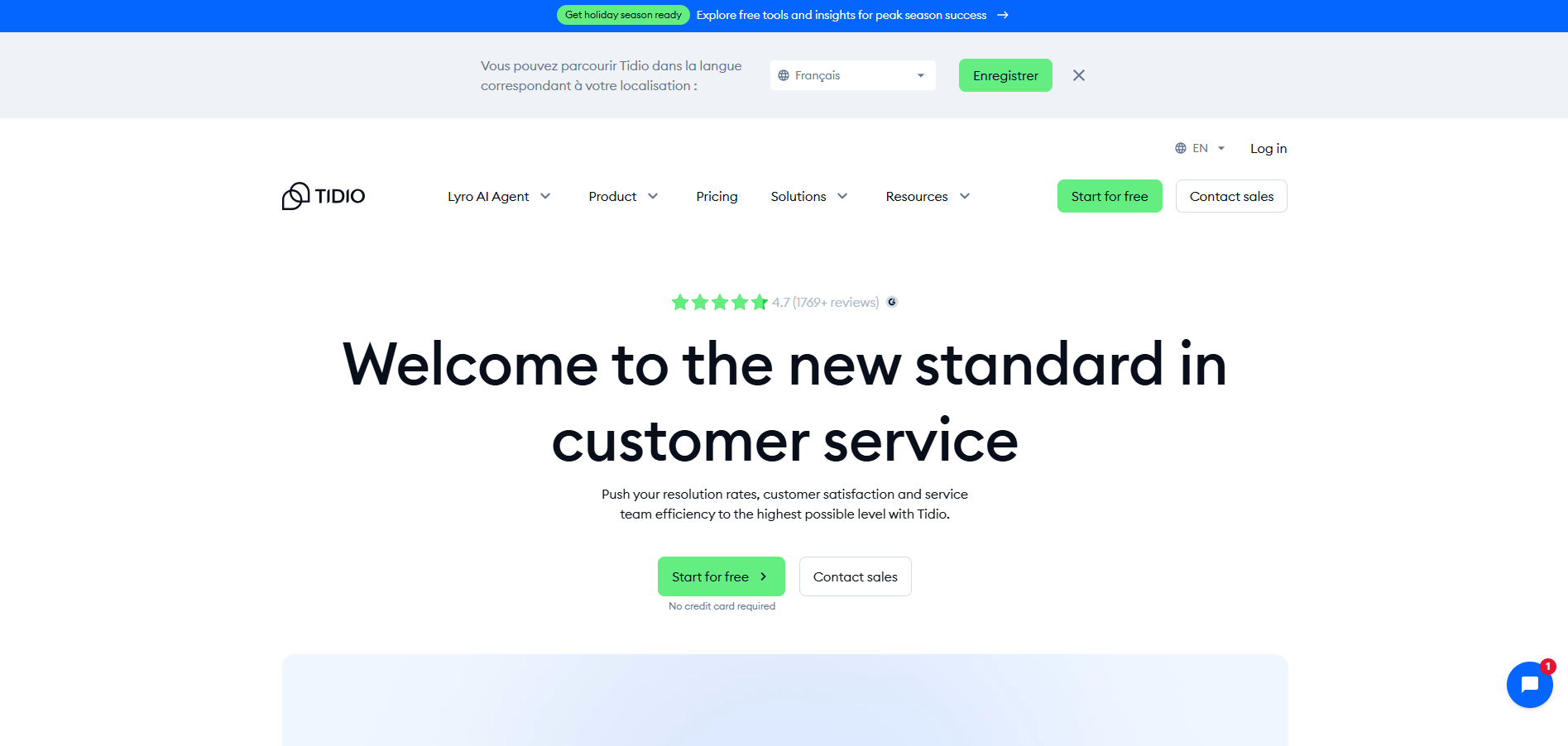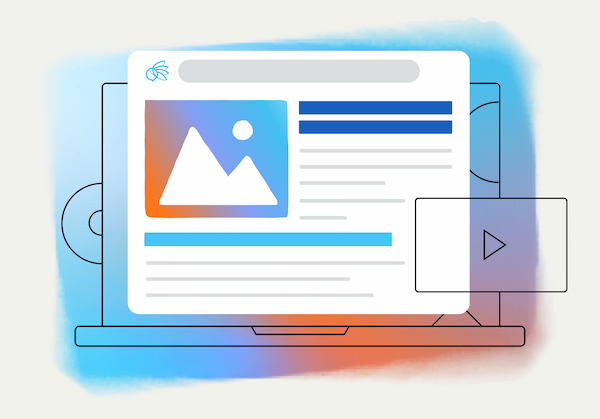Shopify Chatbot for Online Stores
A Shopify chatbot optimizes your online store by providing fast, personalized responses at any time. Discover how this virtual assistant boosts your sales, streamlines the customer journey, and turns every interaction into a genuine opportunity.
Contact Us
For an online shop, the speed and relevance of responses can make the difference between a completed purchase and an abandoned cart. On Shopify, chatbots have established themselves as virtual assistants capable of guiding visitors at every stage of their journey, answering common questions in real time, and smoothing the buying process [1].
In the following article, we'll explore in detail what a Shopify chatbot is, how it works, and most importantly, which are the best tools to turn your interactions into business opportunities.
What is a Shopify chatbot?
More than just quick replies
Equipped with advanced features, these tools can guide shoppers through simple processes: initiating a return, suggesting relevant items, or assisting them through checkout to final confirmation.
The most advanced models use artificial intelligence and natural language processing to observe behaviors, analyze sales, and adjust marketing campaigns almost in real time. This ability to combine data with interaction transforms the chatbot into a lever for continuous optimization.
A customer service ally
Day to day, these virtual assistants handle a large share of support requests, reducing pressure on your human teams and easing demand management. They don't replace human contact, but they filter and prioritize needs, freeing up time for high-value exchanges.
Simplified integration
Deployment is often done in just a few clicks via the Shopify App Store. Once installed, integration with the admin interface is usually seamless: you centralize conversations, manage interactions, and configure the bot's operation—whether based on simple rules or powered by advanced AI.
The Top 5 Best Shopify Chatbots for E-Commerce
Choosing the right Shopify chatbot is essential for optimizing your customer support and driving sales in your Shopify store. With a tool tailored to your business needs—such as an e-commerce chatbot—you'll be better prepared to deliver a smooth, intuitive shopping experience.
1. Target First
Target First is a chatbot solution designed for online shops [1], built to automate customer interactions and improve service efficiency [7].
Available 24/7, this chatbot guides visitors throughout their shopping journey, answers common questions, and helps with decision-making—all in real time.
Key Features
- Continuous availability: Accessible anytime, providing constant support to customers.
- Personalized guidance: Assists visitors with navigation, helps them find products, and answers their questions.
- Automated interactions: Handles FAQs automatically, reducing the customer service team's workload.
- Improved user experience: Delivers instant, relevant information, ensuring a smooth and satisfying shopping experience.
2. Dydu

Dydu is an advanced chatbot solution designed to automate customer interactions while delivering a personalized experience [2].
With seamless Shopify integration, Dydu enables your store to efficiently meet visitor needs.
3. Jotform

Jotform offers an easy-to-use chatbot builder that integrates smoothly with Shopify [3].
It lets you create interactive forms to collect customer information, generate leads, and guide visitors in their choices. With conditional logic, automated notifications, and response tracking, Jotform turns a basic form into an effective conversational assistant.
4. eesel AI

Like Target First, eesel AI doesn't just answer—it acts. Connected to tools like Zendesk or Intercom, it learns from each interaction to become more relevant [4].
For example: a customer asks if a product is in stock. Within seconds, eesel AI checks, responds, and even suggests an alternative if needed. Support becomes proactive—almost human in responsiveness.
5. Tidio

Tidio combines simplicity with efficiency. A small shop can install its multichannel live chat, create rule-based scenarios, and integrate AI to handle FAQs [5].
For example: a visitor is looking for a specific bag. Tidio guides them, suggests alternatives, and even shares a special offer—without any staff intervention. Speed and personalization come together to improve the customer experience.
What's the benefit of having a good chatbot for e-commerce?
In an environment where every click matters, a well-designed chatbot for your Shopify store can become a strategic asset. Far more than just an auto-reply tool, it steps in at critical moments of the customer journey: when hesitation sets in or when a cart is at risk of being abandoned. By immediately providing the right information or offering a targeted promotion, it helps turn interest into a completed purchase.
Driving sales, cart by cart
A chatbot doesn't just assist transactions—it enhances them. With precise recommendations and well-placed upsell offers, it increases the average order value.
Offering the right product or discount at the right time is no accident; it's the result of smart logic, powered by purchase behavior analysis.
Continuous, uninterrupted support
One of the most valued advantages is around-the-clock availability. Whether it's noon or midnight, the chatbot stays operational, handling common requests like delivery times, return policies, or order tracking [6].
This uninterrupted service greatly reduces pressure on teams, allowing them to focus on more complex, high-value tasks.
Data that shapes your strategy
Every interaction generates useful information: product preferences, pain points, engagement moments…
Once analyzed, this data helps fine-tune your marketing campaigns and adjust offers according to real market expectations. It's a virtuous circle: the more you feed the chatbot, the more relevant it becomes.
Meeting today's customer expectations
Modern consumers expect quick, accurate, and naturally phrased responses. New-generation chatbots, often based on natural language processing, can mimic the fluidity of a human conversation.
This makes the buying journey simpler, more pleasant, and ultimately strengthens customer relationships.
What are the different types of chatbots for Shopify?
On Shopify, several types of chatbots are available to meet the varied needs of online stores. These tools help optimize customer service and sales management. Understanding their differences is key to choosing the best chatbot for your e-commerce project.
Main types of chatbots available on Shopify
Not all online stores have the same needs, and Shopify offers a wide range of chatbots to cover different strategies. Choosing the right model depends on your sales volume and the type of interactions you want to automate.
Menu- and button-based chatbots
These assistants use a simple interface: users click on predefined options to get the answers they need.
- Ideal for FAQs like order tracking, opening hours, or delivery conditions.
- Provide quick, clear navigation.
- Follow a tree-logic system: less flexible but highly reliable.
Rule-based chatbots
Everything is pre-programmed. The conversation path follows scripts with specific branches depending on the customer's response.
- Great for automating repetitive, simple requests.
- Limited improvisation for unexpected queries.
Natural Language Processing (NLP) chatbots
These models understand and analyze customer language.
- They adapt responses to context, mimicking human exchanges.
- Provide smoother, more engaging conversations.
- For customers, it feels like real dialogue rather than clicking buttons.
Hybrid chatbots
A mix of rules and AI-powered NLP.
- Combine the speed of scripts with the flexibility of advanced language analysis.
- Ideal for shops balancing quick responses with nuanced requests.
Shopify Chatbot: Best Practices for Success
A well-configured chatbot can transform the customer experience in your Shopify store. But to become a true growth driver, it needs to be integrated and used intelligently.
- Seamless Shopify integration: Connect your chatbot not just to your Shopify admin, but also to your other apps (marketing, CRM, customer support, etc.) [8]. Real-time access to product data, stock levels, and customer histories makes it more effective.
- Leverage NLP intelligence: A chatbot with a strong NLP engine goes beyond menus—it understands natural sentences and replies contextually. This makes conversations smoother, more “human,” and increases engagement. Better then to opt for an AI chatbot.
- Combine automation with human support: Rule-based bots save time for simple requests, but complex or sensitive issues should be handed to a live agent seamlessly. This human-bot combo ensures both speed and service quality.
- Expand across channels: Don't limit your bot to your website. Connect it to WhatsApp, Facebook Messenger, or Instagram Direct. This centralizes conversations and delivers a true omnichannel experience.
- Monitor, analyze, improve: A chatbot should constantly evolve. Regularly review conversations, identify friction points, and adjust responses. Over time, it becomes a strategic asset for boosting conversions and customer loyalty.
How to Choose the Right Shopify Chatbot for Your Online Store
A good Shopify chatbot is more than a “nice-to-have.” It's a tool that can become central to your online business. But choosing the right one means matching it to your real needs.
Clarify your goals
Do you want to enhance customer support? Drive more sales with personalized recommendations? Automate lead qualification? Defining priorities helps identify the right features.
Opt for easy installation
Look for chatbots that install easily from the Shopify App Store, without technical complexity. An intuitive interface and Shopify admin management save valuable time.
Prioritize scalable features
The best bots combine multiple approaches: customizable rules, NLP, and AI-driven learning. Multi-channel compatibility (WhatsApp, Messenger, social networks) is a strong plus.
Check integrations
Your chatbot should connect seamlessly with CRM, support, marketing, and order management tools. APIs and connectors ensure centralized data management.
Assess cost vs. benefit
Consider not just subscription fees, but also setup, customization, and maintenance costs. Weigh these against potential gains in sales, productivity, and customer satisfaction.
Don't neglect security
Ensure the solution complies with regulations like GDPR and protects customer data. Reliability here is also a matter of brand trust.
Boost Your Shopify Sales with a Chatbot
In today's highly competitive e-commerce market, a Shopify chatbot is no longer optional. It smooths interactions, boosts conversions, and builds customer loyalty.
Well integrated, it combines speed, personalization, and analytics to meet modern customer expectations while easing the load on your team.
Whether it's reassuring a hesitant shopper, suggesting add-on products, or centralizing messages across channels, a chatbot acts as a true business partner—always available.
Choosing the right model for your business isn't just a technical decision: it's a direct investment in customer experience and your store's growth.
Thinking about deploying a chatbot on Shopify and wondering how to proceed? Contact our AI experts and discover how an AI assistant can help you boost your sales.
Shopify Chatbot FAQ
Does Shopify offer chatbots?
Shopify provides Shopify Inbox, a live chat tool—but it isn't a native, intelligent chatbot. It centralizes customer conversations.
For more advanced features, the Shopify App Store offers a wide range of third-party apps—from simple rule-based chatbots to AI-powered e-commerce assistants. They go beyond auto-replies by automating support, improving the buying journey, and supporting real-time marketing.
How to add a chatbot to Shopify?
The simplest way is through the Shopify App Store: choose an app, install it, and customize it via your Shopify admin or the provider's dashboard.
For external bots, paste the script provided by your vendor into your theme.liquid file, just before the </body> tag.
Does Shopify use ChatGPT?
Shopify doesn't provide ChatGPT as a built-in bot. However, several chatbot apps for Shopify use GPT-like technology and other NLP models to power their AI.
Citations
- [1]https://www.targetfirst.com/en
- [2]https://www.dydu.ai/integrations/
- [3]https://eu.jotform.com/ai/chatbot/
- [4]https://www.eesel.ai/integration/shopify-ai
- [5]https://apps.shopify.com/tidio-chat
- [6]https://lesmakers.fr/chatbot/
- [7]https://www.appvizer.fr/communication/chat-chatbot/targetfirst
- [8]https://www.shopify.com/fr/blog/chatbots-e-commerce
Top 10 most read articles
